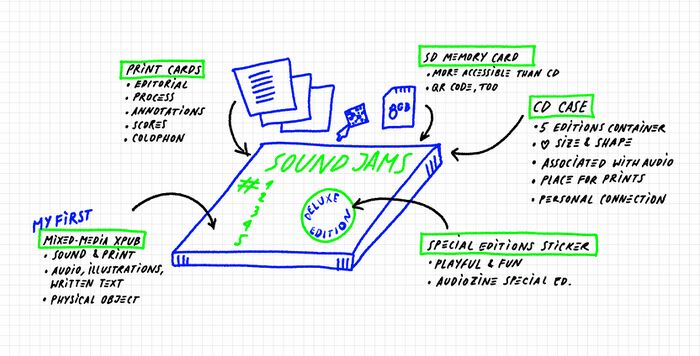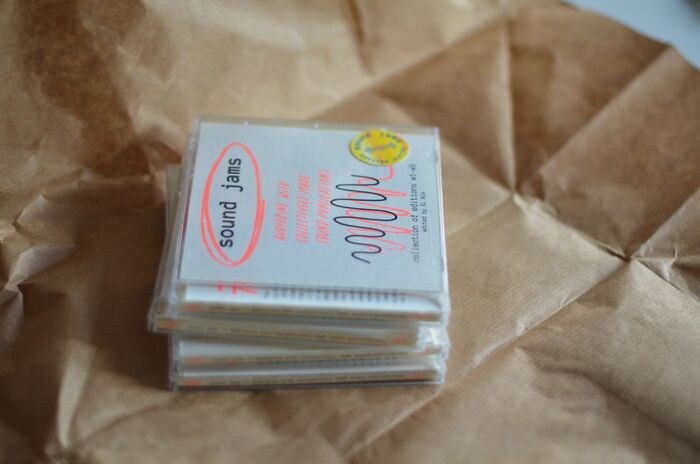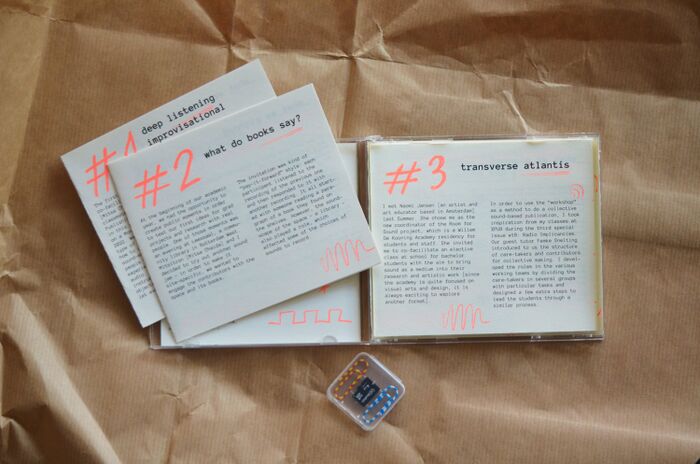Sound Jams: Difference between revisions
No edit summary |
No edit summary |
||
| (8 intermediate revisions by the same user not shown) | |||
| Line 5: | Line 5: | ||
"> | "> | ||
== <span style="color: white; font-family: Menlo; text-decoration:none; background-color: #0033ff; padding-top: 0.1vw; padding-bottom: 0.1vw; padding-left: 0.1vw; padding-right: 0.2vw;">_intro </span>== | |||
'''Sound Jams: Methods of Collective Sound-Based Publication Making | |||
''' | |||
We are surrounded by sound on a daily basis and it is a medium that has a major role in the perception of the world around us. With the exception of people with damaged hearing, it helps us navigate through the spaces we are moving around throughout our days. Our bodies are used to perceiving all sorts of sonic signals while orientating in private and public spaces. We hear other people while having a conversation or attending a meeting. We listen to music to relax, dance or distract ourselves. But as a working medium, it still feels quite unattainable for many practitioners - oftentimes, mainly associated with music, it is a reserved territory for people with musical training and sound artists. In reality, it is far more accessible and there are many ways how sound-making can be open for creators coming from any kind of background. Thus, I | We are surrounded by sound on a daily basis and it is a medium that has a major role in the perception of the world around us. With the exception of people with damaged hearing, it helps us navigate through the spaces we are moving around throughout our days. Our bodies are used to perceiving all sorts of sonic signals while orientating in private and public spaces. We hear other people while having a conversation or attending a meeting. We listen to music to relax, dance or distract ourselves. But as a working medium, it still feels quite unattainable for many practitioners - oftentimes, mainly associated with music, it is a reserved territory for people with musical training and sound artists. In reality, it is far more accessible and there are many ways how sound-making can be open for creators coming from any kind of background. Thus, I was looking at '''''which methods of collective sound-based publication-making can be applied to a group of practitioners from various backgrounds''''', without the restriction of having experience with sound as a medium in their practice.<br> | ||
== <span style="color: white; font-family: Menlo; text-decoration:none; background-color: #0033ff; padding-top: 0.1vw; padding-bottom: 0.1vw; padding-left: 0.1vw; padding-right: 0.2vw;">_context </span>== | == <span style="color: white; font-family: Menlo; text-decoration:none; background-color: #0033ff; padding-top: 0.1vw; padding-bottom: 0.1vw; padding-left: 0.1vw; padding-right: 0.2vw;">_context </span>== | ||
| Line 19: | Line 20: | ||
== <span style="color: white; font-family: Menlo; text-decoration:none; background-color: #0033ff; padding-top: 0.1vw; padding-bottom: 0.1vw; padding-left: 0.1vw; padding-right: 0.2vw;">_research </span>== | == <span style="color: white; font-family: Menlo; text-decoration:none; background-color: #0033ff; padding-top: 0.1vw; padding-bottom: 0.1vw; padding-left: 0.1vw; padding-right: 0.2vw;">_research </span>== | ||
I designed and facilitated various sound jams in order to test the methods in reality and understand what are the important factors when creating a sound-making experience for people from different backgrounds. What brings them together in sound creation and sharing? What elements of the structure and the process are vital for them to find a comfortable and welcoming space for experimentation? What can they take from the sound jams to their artistic and research practice? | |||
== <span style="color: white; font-family: Menlo; text-decoration:none; background-color: #0033ff; padding-top: 0.1vw; padding-bottom: 0.1vw; padding-left: 0.1vw; padding-right: 0.2vw;">_process </span>== | == <span style="color: white; font-family: Menlo; text-decoration:none; background-color: #0033ff; padding-top: 0.1vw; padding-bottom: 0.1vw; padding-left: 0.1vw; padding-right: 0.2vw;">_process </span>== | ||
| Line 30: | Line 31: | ||
== <span style="color: white; font-family: Menlo; text-decoration:none; background-color: #0033ff; padding-top: 0.1vw; padding-bottom: 0.1vw; padding-left: 0.1vw; padding-right: 0.2vw;">_publication </span>== | == <span style="color: white; font-family: Menlo; text-decoration:none; background-color: #0033ff; padding-top: 0.1vw; padding-bottom: 0.1vw; padding-left: 0.1vw; padding-right: 0.2vw;">_publication </span>== | ||
<br> | For my graduation project, i decided to try something completely new for me - to create a mixed-media publication that will accommodate the 5 sound jams i facilitated over the last year. It has to be a form that can contain the information about the processes i facilitated, the annotations of what happened, the visual scores, but also the audio files. Considering the lack of access to CD players these days, i decided to play with the format of a CD case but disrupt it - to use the box as a nostalgic reminder of my teenage years of collecting and recording CDs, but put something more accessible inside. The result is a case that has 6 booklets [laser and riso print on kasaka 90 gram paper], a memory SD card [containing the 5 sound jams] and 2 paper clips [a particular model from my primary school years]. On the cover there is a little joke - a funny, trashy sticker “deluxe edition” as a reference to the collection CDs in which there are more sonic pieces than the usual edition. | ||
<br><br> | |||
[[File:5 xpub2 project.jpg|frameless|700px]] | [[File:5 xpub2 project.jpg|frameless|700px]] | ||
<br><br> | |||
[[File:Sound-jams-0.jpg|frameless|700px]] | |||
<br><br> | |||
[[File:Sound-jams-4.jpg|frameless|700px]] | |||
<br> | <br> | ||
''Sound Jams: Deluxe Edition'' gathers five collectively made sonic publications and their visual elaborations within the walls of a CD case. It aims at inspiring practitioners to play with different methods for including sound in their research and artistic practice. This bubblication in a rectangle form collects the outcomes of facilitated group experiences of sound-making and publishing. | |||
__ | __ | ||
Including excerpts from my master's thesis ''Sound Jams: Methods of Collective Sound-Based Publication-Making for Practitioners from Various Backgrounds'' | Including excerpts from my master's thesis ''Sound Jams: Methods of Collective Sound-Based Publication-Making for Practitioners from Various Backgrounds'' | ||
Latest revision as of 22:14, 6 July 2023
_intro
Sound Jams: Methods of Collective Sound-Based Publication Making
We are surrounded by sound on a daily basis and it is a medium that has a major role in the perception of the world around us. With the exception of people with damaged hearing, it helps us navigate through the spaces we are moving around throughout our days. Our bodies are used to perceiving all sorts of sonic signals while orientating in private and public spaces. We hear other people while having a conversation or attending a meeting. We listen to music to relax, dance or distract ourselves. But as a working medium, it still feels quite unattainable for many practitioners - oftentimes, mainly associated with music, it is a reserved territory for people with musical training and sound artists. In reality, it is far more accessible and there are many ways how sound-making can be open for creators coming from any kind of background. Thus, I was looking at which methods of collective sound-based publication-making can be applied to a group of practitioners from various backgrounds, without the restriction of having experience with sound as a medium in their practice.
_context
By a sound jam, I understand any facilitated process of sound-making and publishing that includes more than one person. Its core principle is inclusivity: it is open to people with or without musical training and offers a structure in which everyone is invited to find a suitable role and space for experimentation. The process grants the makers the opportunity to create a sound publication as a group. This paper explores different sound jams as applied methods that provide such processes and a safe space for makers to open up to a moment of collective sound-making and sharing.
The research draws its core inspiration from the work of Pauline Oliveros, a pioneer of experimental music and improvisation who was active after the 1950s. In her practice, she investigated new ways to focus attention on music including her concept of deep listening - “a practice that is intended to heighten and expand the consciousness of sound in as many dimensions of awareness and attentional dynamics as humanly possible” (Oliveros, 2005). With this research, I take it further from the meditative sessions and inner listening and explore ways to create a structure for practitioners to apply this in their group sound-making processes of any kind.
_research
I designed and facilitated various sound jams in order to test the methods in reality and understand what are the important factors when creating a sound-making experience for people from different backgrounds. What brings them together in sound creation and sharing? What elements of the structure and the process are vital for them to find a comfortable and welcoming space for experimentation? What can they take from the sound jams to their artistic and research practice?
_process
There were 5 sound jams that I facilitated to conduct my master's research:
▶ sound jams: reversed words // 3~4-2023 // open online call
▶ sound jams: resister at worm // 12-2-2023 // worm, rotterdam
▶ sound jams: transverse atlantis // 16~20-1-2023 // willem de kooning academy, rotterdam
▶ sound jams: what do books say? // 17-10-2022 // leeszaal, rotterdam
▶ sound jams: m&m at pzi // 10-10-2022 // piet zwart institute, rotterdam
_publication
For my graduation project, i decided to try something completely new for me - to create a mixed-media publication that will accommodate the 5 sound jams i facilitated over the last year. It has to be a form that can contain the information about the processes i facilitated, the annotations of what happened, the visual scores, but also the audio files. Considering the lack of access to CD players these days, i decided to play with the format of a CD case but disrupt it - to use the box as a nostalgic reminder of my teenage years of collecting and recording CDs, but put something more accessible inside. The result is a case that has 6 booklets [laser and riso print on kasaka 90 gram paper], a memory SD card [containing the 5 sound jams] and 2 paper clips [a particular model from my primary school years]. On the cover there is a little joke - a funny, trashy sticker “deluxe edition” as a reference to the collection CDs in which there are more sonic pieces than the usual edition.
Sound Jams: Deluxe Edition gathers five collectively made sonic publications and their visual elaborations within the walls of a CD case. It aims at inspiring practitioners to play with different methods for including sound in their research and artistic practice. This bubblication in a rectangle form collects the outcomes of facilitated group experiences of sound-making and publishing.
__
Including excerpts from my master's thesis Sound Jams: Methods of Collective Sound-Based Publication-Making for Practitioners from Various Backgrounds



